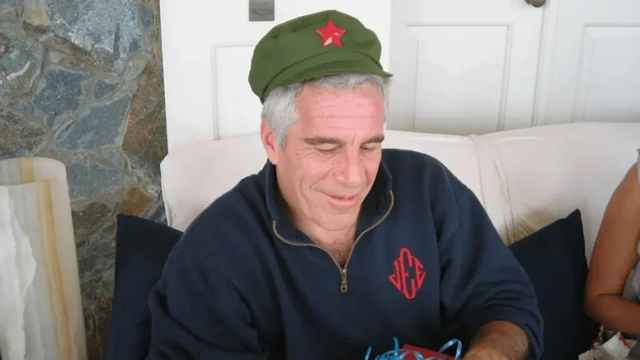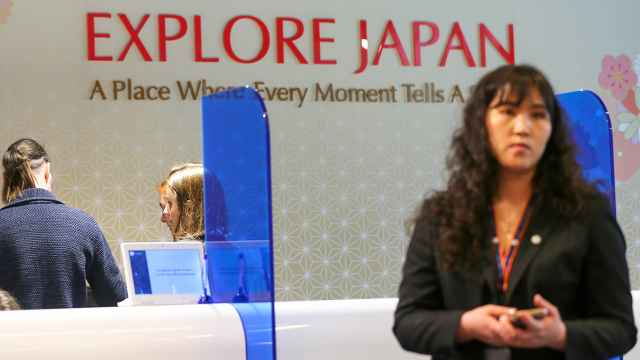Brand recognition is everything in business, and the Googles, Coca-Colas and Apples of the world spend billions of dollars every year building loyalty.
But Vladimir Vilde, a self-made entrepreneur who surreptitiously printed prohibited literature in Soviet times and now builds $15 million palatial villas for the fabulously wealthy, says things are quite different here.
"Nobody wants to know the company, everyone knows the name of the owner," Vilde said in an interview. "So the most important thing is the reputation of a person, and it doesn't matter if he has a dozen or a hundred companies."
Education/Work Experience
I began studying Automatics and Electronics at the Moscow Engineering and Physics Institute (MIFI) in 1978, but I never had the mindset to sit behind a desk all day. So I tried my hand at all sorts of jobs, including carving iconostases for churches. The list of jobs is quite a long one. Later I worked in several other places, including Kazakhstan, to support my family in Moscow. In the early 1990s, an old friend and I started our own small business, just the two of us, renovating and fitting out premises, and this gradually grew into a construction company.
Favorite book: “Life and Fate” (Zhizn i Sudba) (1980) by Vasily Grossman
Reading now: A collection of Winston Churchill’s speeches from 1938 to 1946, with extracts from earlier speeches, going back to 1919.
Movie pick: “The White Sun of the Desert” (Beloye solntse pustyni) (1970) directed by Vladimir Motyl
Favorite Moscow restaurant: Italyanets, 13 Samotechnaya Ulitsa
Best weekend getaway: I don’t do weekend getaways. My favorite vacation destinations are Crimea and the Seychelles Islands.
Vilde doesn't advertise his Kensington development company, which in addition to constructing Palladian villas with Greek-style columns — his specialty — raised the 50-odd houses in Anosino, a state-of-the-art village on Novorizhskoye Shosse in the Moscow region. In fact, Vilde closed his company's web site months ago. "I came to the conclusion that I didn't need it. We are widely known in a very narrow circle," he said.
In Vilde's world, professionalism and keeping promises mean everything. While big Western investors might be able to turn to senior officials for help in dealing with extortion, Vilde avoids corruption by keeping his distance from the authorities. He said he only works with private clients — whom he carefully screens — and refuses to accept contracts involving state budgetary funds. He spoke with disapproval about "sawing the budget," Russian slang for the practice in which private contractors pay kickbacks to the various officials who award them projects.
His sense of ethics stretches back to the 1980s, when he got involved in samizdat, the self-publication of prohibited books, particularly New Testaments.
"The only way to learn was through reading forbidden books," he explained. "There was nothing to learn in Pravda."
Vilde, a Russian Orthodox Christian, and his dissident friends obtained a small printing press, and because it was noisy, placed it in the basements of people willing to help out, he said. But they noticed something. Several months after placing the printing press in a basement, their benefactors would practically go insane. The constant fear that the next knock on the door would come from the KGB shattered their nerves, he said.
So Vilde and his friends acquired a dilapidated hut about 200 kilometers away in the Tver region. But then they started to worry about being caught there. The arrival of Muscovites in the small village would certainly attract attention.
Sure enough, shortly after they set up shop in the hut, a villager knocked on the door. And he was curious about something: He wanted to know if he could borrow 3 rubles to buy vodka. Soon another villager dropped by — with a similar request. Over time, all the villagers seemed to visit the hut. None returned.
"They didn't want to be reminded that they owed us money," Vilde said.
While the villagers' fondness for vodka protected Vilde's secret, the incident added another plank to his code of ethics: a deep distaste for alcohol. Vilde, who doesn't drink, rued that alcoholism has spiraled into a national tragedy.
Vilde, 50, who was born in Moscow but worked in several countries before returning to Russia around the time of the Soviet collapse in 1991, sat down with The Moscow Times to explain how he manages to succeed without the influence of powerful politicians and how a sense of patriotism and hope has encouraged him to soldier on in a sometimes daunting investment climate.
This interview has been edited for length and clarity.
Q: Why didn't you emigrate from Russia?
A: I've tried my hand at different things in different countries, but the bottom line is this: It is possible to work in Russia, and that's why I stay here. The difference between the Soviet era and today is that now it is possible to live in this country, while in the Soviet Union it wasn't, at least for the people who understood what was happening. This little change makes all the difference.
Yes, there are many rules here that make life difficult, and many stem from the "vertical power," which mirrors the way things were in the Soviet Union. The Soviet authorities wrote rules that clearly nobody could follow. The rules of the game forced people to lie and steal. Then, if the authorities wanted, they could easily prove that a person was dishonest and put him into prison — and he would have nothing to say in his defense.
Nowadays, an openly acknowledged vertical power structure is back because it is much easier to rule a system where everybody is almost forced to be dishonest. Everyone today is thinking about how not to pay taxes, and many are not paying taxes. Maybe I'm wrong — I'm not a professional economist — but it seems to me that the government doesn't care about how much tax money it collects from entrepreneurs. The country lives on oil and gas money. So the authorities don't mind if you put a little extra into your pocket — just don't touch their main income from oil and gas. In oil and gas, the money is counted carefully and is untouchable.
No one knows how much money is stolen from the federal budget — maybe 20 percent, maybe a third. There are many ways to steal and, for this reason, I don't work with budgetary funds. I will never, ever work with the budget because the rules for working with the budget are actually how to "saw" it.
Living in the Soviet Union, we were sure that all of our troubles came from the government. But living here for the last 20 years in a more or less market economy, I have realized, unfortunately, that the government is merely a reflection of the people. The authorities probably cannot act in any other way; they're just reacting to what they receive from below, from the masses of people who have only one understanding of life.
Q: How do you run a successful business under these circumstances?
A: The answer is easy: You must be professional under all circumstances and under any regime. The more difficult the conditions become in this country, the more professional you must be. When I was studying in school, I realized that if I didn't want to be a Komsomol member, I would have to study very well, better than the others, in order to succeed. When you're living in an economy like ours, you must be very professional and always fulfill exactly what you promise. If you promise to hammer a nail into the wall and you hammer it well, you will be known as an independent, highly professional craftsman, wanted by many and able to command a good salary. You can build palatial villas like I do. But I only got this far through small steps, each of which was fulfilled with professionalism and predictability. Other people must know that what I promise will really happen.
Ultimately, whether a person is honest or dishonest, he will still look for the best professionals when he wants something done for himself, and he will come to me. It doesn't matter if he shares my views or likes me personally — he wants to hire me because he has seen the previous houses that I have built. The result is we are overloaded with work, even though we are very careful in taking on clients. We want nothing to do with shady deals.
Q: How do you deal with corruption?
A: Let me tell you a funny story. One developer — my neighbor — was building a luxury village when two guys showed up and announced that they were archeologists. They asked for $1,000 on the spot and they would leave. My neighbor was very surprised, saying: "What the hell do you want from me? This is just a piece of land, nothing more." He refused to pay. Within half an hour, the archeologists said they believed they had found the remnants of an ancient settlement on the land and shut down the development. The project was blocked for half a year. My neighbor couldn't do anything. Of course, in the end he paid — and much more than $1,000. I think he paid $10,000 for their, well, investigation.
Bribery happens, but it is already factored into the final cost of everything in Russia. Look at oil stocks, for example. Their price reflects all the good and bad news in the market.
Q: What advice would you offer a foreigner who wants to invest or expand in Russia?
A: If they come here with preconceived Western views on business, unsupported by local advice and expertise, I would say: "Don't come." They simply won't be able to sort out all the problems on their own — it's impossible. Maybe something will change in this country in a hundred years, but not now.
Q: Being professional isn't enough?
A: It's not enough. A foreigner will not be allowed to exercise his professionalism — and to be professional means that you can solve problems. If you cannot solve problems, you will not be able to fulfill your promises.
I have my own impression about foreigners who come here. From my point of view, they are very flexible, ready to accept the Russian rules of the game. I work constantly with foreigners from Britain, Germany and Switzerland, and they seem to be very ready to collaborate with the various people who come to them for money — much softer than some Russians. Some of us are trying to change things here for the better, and we have principles that we won't violate, like my decision not to work with the budgetary funds.
I would not recommend coming here without what is called a krysha, a roof — somebody who has the power to keep an eye over your interests and help you with this or that. But he will probably want the biggest slice of the pie. It is no secret that this is actually what many officials do, provide a roof for various business. There is a widely held view that even some State Duma deputies provide this kind of patronage, but as I don't have anything to do with them, I have no personal experience with this.
Q: Could you describe a problem you have resolved and what you learned from it?
A: If you build in Britain, Switzerland or even in Turkey, I think, you can be integrated into an existing network that provides planning permission and infrastructure from engineering companies. In Russia, you are like a man abandoned in Siberia, and you have to start from scratch for every project. It's like you have to reinvent the match or the wheel for a bicycle.
People in Russia think that the only place where it's possible to live is in Moscow, and that is why so many are moving to Moscow every year and there are so many cars on the roads. Everyone wants to squeeze into Moscow, which by the way is not made of rubber.
But this migration trend is happening because there is no infrastructure anywhere else. When you're developing a property like a cottage settlement, you have to start from the very beginning: You have to find your own water, your own sewage, your own drainage, your own gas and your own electricity — everything. You cannot imagine anything like this happening in Europe. This is why property costs so much here. It's not easy to connect all that infrastructure. To make a village, you need to have enough cash in hand and perfect relations with the banks, and to get the funds you have to promise homebuyers that they will have the necessary infrastructure in their new homes.
You must remember that if you do not fulfill what you promise just once, everyone in the world will remember. If you fulfill what you promise 1,000 times, nobody will remember; but if you promise and don't fulfill it once, you will receive a bad reputation and nobody will come to your settlement or buy a house.
Q: Remind me why you stay in Russia?
A: We're all in the front-line trenches together. We don't live for the money at the end of the day. We must improve things a little bit, or at least try. Maybe we will fail. But 20 years ago, nobody would have believed what has happened in Russia. I remember meeting with Alexander Solzhenitsyn, while working on his house, and thinking that his Soviet-era promises to return to Russia were strange. The Soviet Union seemed stable at the time, but it turned out to have feet of clay.
Q: Who or what inspires you?
A: I've met interesting people during my life, like Alexander Solzhenitsyn and Vladimir Bukovsky. But as I have grown older, I have come to the conclusion that it's very difficult to be inspired by man alone. I keep in mind that, come Judgment Day, I'll have to answer for everything I have done.
Q: What is your secret to successfully managing people and business here?
A: My most important employees, the engineers, have worked in the company for a long time, 10 to 15 years, and we have become like one body. We are so closely attached to one another that it is difficult to imagine anyone leaving.
Salaries depend on the company's financial situation. But workers can always be sure of one thing: that we'll pay them.
I don't think I have any secret that motivates them to work hard. The only thing I can do is to work harder myself. I stay with the workmen on construction sites day and night. I work on Saturdays, and my wife is very angry about that. I live for vacations, which I try to take every two months, for a week or two weeks — but only when there is an opportunity for a break. My employees know that we are all in the same boat.
A Message from The Moscow Times:
Dear readers,
We are facing unprecedented challenges. Russia's Prosecutor General's Office has designated The Moscow Times as an "undesirable" organization, criminalizing our work and putting our staff at risk of prosecution. This follows our earlier unjust labeling as a "foreign agent."
These actions are direct attempts to silence independent journalism in Russia. The authorities claim our work "discredits the decisions of the Russian leadership." We see things differently: we strive to provide accurate, unbiased reporting on Russia.
We, the journalists of The Moscow Times, refuse to be silenced. But to continue our work, we need your help.
Your support, no matter how small, makes a world of difference. If you can, please support us monthly starting from just $2. It's quick to set up, and every contribution makes a significant impact.
By supporting The Moscow Times, you're defending open, independent journalism in the face of repression. Thank you for standing with us.
Remind me later.






